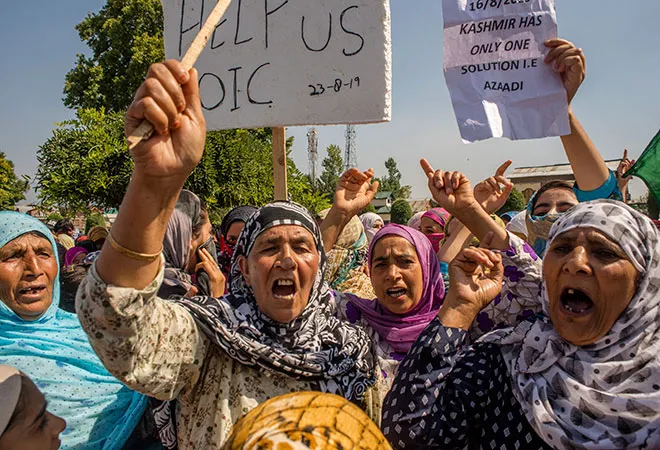
Suspending the right to communication, movement and expression insinuates that all the people of the Valley are hatemongers and under suspicion. Seven to eight million people barricaded in their homes with no internet, landline or mobile connectivity does not appear to be an attempt to integrate them into a country that is democratic and believes in the ideals of liberty, equality and fraternity.
The Universal Declaration of Human Rights (1948) states that “everyone has the right to freedom of opinion and expression; the right includes freedom to hold opinions without interference and to seek and receive and impart information and ideas through any media and regardless of frontiers.” According to the Preamble of the Constitution of India , the People of India declares that “they gave unto themselves their resolve to secure all the citizens liberty of thought and expression.” This shifts the limelight onto the eager question that arises, “is this an attempt to integrate Kashmir into India ‘democratically’, or an attempt to breach human rights through a false illusion of democratic freedom?” India is a proud democracy and opening channels of communication with Kashmir at this point is an opportunity for us to prove that we can move mountains — democratically.
India is a proud democracy and opening channels of communication with Kashmir at this point is an opportunity for us to prove that we can move mountains — democratically.
The ongoing conflict in the Valley has two aspects — political and communal. The politics of the State and its geographic location aids the conflict that emerges out of the communal Hindu-Muslim conflict. The youth of Kashmir have grown up in an environment of unrest and the call for ‘Azadi’ stems out of a fragmented sense of identity. The constant presence of the military for decades has created a sense of fear and of course, alienation. When the Chief Minister Mehbooba Mufti herself ruled out the revocation of AFSPA in February 2018 ‘due to the prevailing situation,’ there does not appear to be a political will to correct the situation in favour of growth and development. Despite being aware of atrocities by the Indian army in the state, she also stated that the Indian army is “the most disciplined army in the world.” AFSPA has been revoked in other parts of India once the insurgency has decreased. There is hope for Kashmir if they can settle their internal differences about whether their definition of ‘Azadi’ as an independent J&K, will bring them peace, growth and stability.
Pakistan has taken advantage of this confusion among the Kashmiri communities and a weak state leadership to destabilize not only Jammu and Kashmir, but also India. The externalities of Kashmir geopolitics have resulted in a fractured idea of ‘Azadi’, the idea of which is different across gender, age, locality and class. Students of government schools, private schools, those in universities; people living in upmarket areas of Kashmir and those who are part of the old cities and the remote districts — all have their own idea of ‘Azadi’.
The question that we should ask the Kashmiris fighting for ‘Azadi’ whether they are well equipped to run an independent nation and defend themselves from Pakistan sponsored terrorism.
The question to ask ourselves, then, is whether we can make an assumption that ‘Azadi’ necessarily means freedom from India? The question that we should ask the Kashmiris fighting for ‘Azadi’ whether they are well equipped to run an independent nation and defend themselves from Pakistan sponsored terrorism. Are they better off without Indian support, both economic and military? Should they constrain their youth from pursuing opportunities, buying property and seeking stability in other parts of India? Should they deter business houses from India and across the world from investing in Kashmir and creating employment and development opportunities?
These questions can be addressed only when we open dialogue with the people of Kashmir who are today living in the undemocratic situation of no communication avenues and no free speech. This is yet another form of repression and our leaders should be well aware that dialogue always wins, not keeping people cloistered and shut away from voicing their opinion. The Indian government must let the Kashmiri voices out in the open, while NGOs and civil society play an active part in nurturing dialogue amidst high tension and ease Kashmir into an era of integration, growth and development.
The views expressed above belong to the author(s). ORF research and analyses now available on Telegram! Click here to access our curated content — blogs, longforms and interviews.




 PREV
PREV


